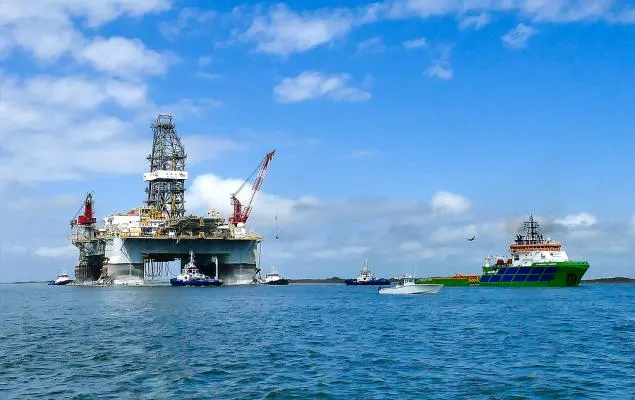[On 20 October, exactly three weeks before the beginning of COP30 in Belem, Brazil’s environmental regulator, IBAMA, finally approved a licence for the state-controlled oil company, Petrobras, to drill an exploratory well off the coast of Amazonia, close to the mouth of the Amazon River. That same Monday, within hours of the announcement, drilling began. A couple of days later, Petrobras said it would need to sink three more wells in Block 59 to evaluate the exact extent of the reserves. Petrobras is hoping these deep-sea oil fields will prove to hold reserves similar in size to the estimated 11 billion barrels that Exxon-Mobil has begun to exploit further north off Guyana, in waters disputed with Venezuela. That’s more than 30 times the amount of oil held in the Rosebank field off Shetland, which the UK government is about to rule on.
On 23 October, eight Brazilian NGOs sought a legal order to block the drilling. They pointed to the lack of any proper consultation with Indigenous peoples in the region, and the failure of any full evaluation of the environmental impact, both locally and globally. They suggested the move made a mockery of the Brazilian government’s commitments for the coming COP30. But it seemed unlikely their injunction request would succeed. President Luis Inacio Lula da Silva, of the Workers Party (PT), regretted that “nobody is in a position to do without fossil fuels”. He said the income from the Amazon oil would be used to combat poverty and pay for the transition away from fossil fuels.
Subverta, one of the currents in the PSOL that makes up the Brazilian section of the Fourth International, says the decision reflects a much more fundamental limitation in the government’s approach to the environment.]
On the eve of COP 30, to be held in Belém in Pará, this decision is by no means just a technical choice, but rather a political repositioning of Brazil in the face of the global climate crisis; it contradicts the image of a country seeking to lead a global just transition and reinforces the perception that Brazil remains trapped in a historical cycle of dependence and extraction.
Although the current government’s programme is based on an ecological transition with social and environmental justice, this authorisation of oil exploration in one of the most sensitive regions of the planet highlights the contradictions between theory and practice. The rhetoric of a ‘just transition’ collides with the continuation of an extractive model that depends on fossil fuels, and which is justified on the grounds of energy sovereignty and national self-sufficiency.
Exploration on the Equatorial Margin will have an impact well beyond Brazilian territory. Much of the oil extracted would go for export, transferring emissions to other countries and undermining Brazil’s global climate responsibility. According to estimates by climate organisations, burning the oil potentially extracted from this region could release more than 11 billion tonnes of CO₂. That is about 5% of the total remaining carbon budget available if warming is to be limited to 1.5 °C. In other words, this has a planetary impact, not just a regional one, which compromises the country’s role in the international climate fight.
This puts us in a situation of even greater climate insecurity and uncertainty. The planet has already exceeded seven of the nine planetary boundaries (defined by the scientific community as the limits of stability for the planet’s ecosystems), and the fossil fuel industry is primarily responsible for this. It is a mistake to expand drilling for more wells, wherever they may be.
In addition to the environmental and climate impacts, there is also an economic argument that cannot be ignored. Several international studies, such as those by the International Institute for Sustainable Development (IISD), warn that Petrobras’ oil expansion represents a high-risk investment. They estimate that up to 85% of new production projects would only be profitable in a scenario of global warming above 2.4°C, i.e., in a context incompatible with the Paris Agreement targets. Although economic factors and figures alone should not be our main motivation for rejecting exploration, they show that, even according to the logic of profit, the country is investing in assets that may quickly become stranded by the global transition to renewable sources.
Petrobras, as a strategic company, occupies a paradoxical position in this situation. While seeking to reposition itself as a leader in the energy transition, with many renewable energy projects (despite a number of conflicts around wind and solar power plants in the Northeast of Brazil) and a lot of green advertising, it is also investing heavily in new oil fields. IBAMA’s decision legitimises this ambiguity, and puts off confronting the need for a social and territorial restructuring of the energy sector.
The Equatorial Margin coastal region, stretching from Natal in the Brazilian Northeast to the border with French Guyana, is renowned for its high marine and river biodiversity, as well as being home to artisanal fishing communities, quilombolas and indigenous peoples who depend directly on coastal ecosystems. Even the installation of infrastructure for research and exploration in the Amazon estuary region will have a significant impact, not to mention the future risk of oil spills and contamination that could damage entire ecological chains, affecting fishing, water quality and traditional ways of life.
From an eco-socialist perspective, the permit given to Petrobras shows that territories on the periphery continue to be sacrificed for the sake of a centralised, dependent development project; it illustrates in practice the impasse of a ‘transition’ that has been captured by capital. It is not a question of denying the need for energy, but of questioning who produces it, according to what logic, and in the service of what kind of society.
Drilling for oil in the Amazon estuary reveals a conflict between two kinds of rationale: the productivist rationale (of ‘commodity peoples’, in the words of Davi Kopenawa), which transforms nature into a commodity, and the ecological rationale (of the forest peoples), which understands the interdependence between living systems, territories and cultures. Defending the Amazon is not an ‘environmentalist’ demand in the narrow sense, but a political struggle for other ways of living and other kinds of social reproduction. Protecting the mouth of the Amazon means fighting for a future for our civilisation that cannot be measured in barrels of oil, but in flows of life, autonomy and socio-environmental diversity.
This dispute between different rationales also reveals how the path of more drilling for oil reproduces historical inequalities. The indigenous, quilombola and traditional communities that live on the Amazonian coast find themselves confronting the advance of the energy frontier with no access to real decision-making mechanisms. The absence of any free, prior and informed consultation, as laid down in ILO Convention 169, reinforces the marginalisation of these peoples. The colonial logic of exploitation and environmental racism is revived, imposing socio-environmental risks on those who benefit least from the extracted wealth.
The challenge facing the progressive camp, especially those who make up the social and political base of the government, is to insist that there can be no socio-environmental justice without a break with fossil capitalism. We need to strengthen initiatives that contribute to the development of a new energy infrastructure, with communities playing an active part from the planning stage onwards the aim must be to replace thermal power and fossil fuels with decentralised, accessible, renewable and low-pollution public infrastructure at all levels.
We are opposed to any new thermal power plants, to drilling new oil wells and all other polluting projects, as well as to renewable power projects that lack socio-environmental justice. We must continue to promote dialogue with oil workers’ unions and other workers in the fossil fuel sector. Only organised struggle will be able to stop fossil capitalism, and we call on everyone to join us in this struggle!
22 October 2025



